His beard grew bigger
He looked like a beggar
He couldn’t bag ‘er
For want of a booger
Mucoshave
Author: bobg
(Bat|Super)man Returns
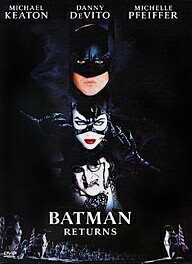 This made me think of 1992’s Batman Returns. What “returns” in that movie? Nothing; Batman hasn’t been away since the events in 1989’s Batman. On the contrary, in that title, “Returns” refers to the fact that it’s been three years for the audience since the last Batman movie. Batman “returns” to moviegoers. (Or perhaps, more cynically, Batman provides “returns” on the studio’s investment. Hard to be too cynical about the studio [Warner Brothers] and the franchise that famously required director Joel Schumacher to make Batman & Robin “more toyetic.”)
This made me think of 1992’s Batman Returns. What “returns” in that movie? Nothing; Batman hasn’t been away since the events in 1989’s Batman. On the contrary, in that title, “Returns” refers to the fact that it’s been three years for the audience since the last Batman movie. Batman “returns” to moviegoers. (Or perhaps, more cynically, Batman provides “returns” on the studio’s investment. Hard to be too cynical about the studio [Warner Brothers] and the franchise that famously required director Joel Schumacher to make Batman & Robin “more toyetic.”)
It’s an annoying case of breaking the fourth wall with the film’s title — a trend begun, ironically, with 1978’s Superman: The Movie, closely followed by Star Trek: The Motion Picture in 1979. Hey — we know they’re movies. (Or, excuse me, motion pictures, as the case may be.) Tell me what happens in the movie. Fight Club, 12 Angry Men, Run Lola Run, those are movie titles. In a movie called Superman: The Movie, I’d expect to see Superman busting film-industry crooks on a studio backlot in Tinseltown.
The Batman and Star Trek franchises continued offending with Batman Forever (which can be interpreted no other way than as the producers thumping their chests in an “I’m king of the world!” moment) and Star Trek: The Next Generation (“next” after what? after the last time you folks watched a Star Trek TV show, that’s what). I’ve always found it strange that none of the gatekeepers of pop culture ever raised aesthetic objections to badly chosen titles like these (until now, of course, if we can agree to call me “gatekeeper”), whose conflation of the real and imaginary threatens to take the viewer out of the fictional world even before they step in.
I was pleased to see that the [Superhero] Returns title template has been redeemed by having “Returns” refer to events in the story. Maybe now we can work on redeeming …The Next Generation by having the story be about the actual children of characters from a prior story. Ugh, maybe not.
The armory
We did not encourage swords in our house, I swear. (Nor did we enhance their allure by making a big deal out of prohibiting them.) But then Jonah won a plastic katana at the Marin County Fair (really, he did, all on his own, by popping balloons with thrown darts), so then of course Archer had to have one too. One thing led to another and… well, now look.
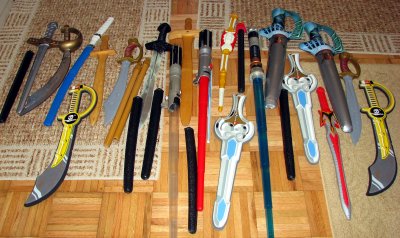
Yes, every object in that picture is used as a sword (and plenty of others, ad hoc), even the ones that don’t look like swords.
Every time we go to the supermarket (which is near the toy store), it’s:
Jonah: Can we go to the toy store?
Me: What do you want to get?
Jonah: Swords. [Archer nods vigorously in agreement.]
Me: [exasperated] Don’t you have enough swords?!
Jonah: Just one more. Pleeeeeease?
Well, at least the “just one more Thomas the Tank Engine train, pleeeeeease” phase is over. Maybe this one will end too. Meanwhile, guess what Archer’s Christmas wish list was? In its entirety, quote:
One little sword.
Not me
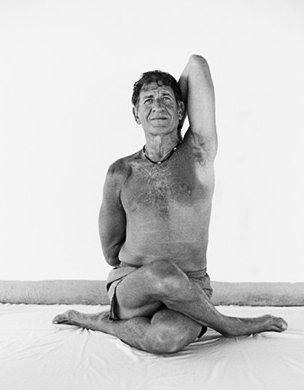
(Photo credit: Patrick Farrell.)
What brings you here?
Herewith, a selection of search-engine queries that resulted in hits on this blog, according to my server logs.
watch neighbor undress; exploratorium; fizzies pulled; thailand’s greatest hits; what happened to fizzies tablets; what are the three kinds of mammals; violet incredible pez; watching neighbor undress; “new rabbi”; Rosh Hashanah; “the federation trading post”; persian candy floss recipes; “citric acid” science pop candy; supine lady; lesbian sex; ursula.sex; how to explain the theory of crystallization to third graders; evil cats; i feel like crying; Comcast Removes West Coast Feeds; boycott disney & abc path to 911; raiders-of-the-lost-ark Pirates-of-the-caribbean; “name the moon” greg; Reality an space-time; “francis heaney”; “smut shack”; squeamish cure; doggie style sex; webby awards; amy linker; cynthia nixon; quarks tangles; “mill valley pediatrics”; “dildo with suction”; proposition moveon endorsements; hypothermia kim; steve elliot bdsm; “instant soda”; trish gee wordpress; song meanings splashdown; “yours yours yours”; fligth to mars; “lesbian vampire fiction”; “needed a diaper”; disney fingerprints; fizzie drink discs; ben kenobi obgyn; linux backup s3; melissa kaplan sings; “adam stoller”; splashdown catalogue; “santa claus ain’t”; vote to boycott abc disney path to 911; joe costanzo; doggie style sex positions illustrated; Fizzies drink tablet recipe; “jack mccoy”; charteris; tune out, turn off; incremental jungledisk; “no fireflies” long island 2006; vampire lesbian; Thai Pilot; boisterous laugh audios; simpsons ulysses; sephardic pirates kritzler; backup osx hardlink incremental; karma slave karaoke; voyager pale blue dot send back the image; comcast digital artifacts; Con Edison; What year did the sitcom premiere I dream of jeannie; Recently got digital cable still receiving all premium channels; joseph costanzo, jr.; Superman reversing time; three kinds of meat; video koyaanisqatsi koyaanisqatsi; chabad palo alto; 9/11 personal; “Calculatrivia”; viscera at&t.
Jonah 1, parental instruction 0
Jonah has learned to ride a two-wheel bicycle entirely on his own! And here I was looking forward to teaching him using a novel (to me) technique suggested by my friend Bart.
When I learned to ride a bike, it was after hours and hours, spread acrosss days and days, of coaching from my dad, who jogged along behind me holding my bike upright, like a human pair of training wheels. One day as I was finally getting the feel of it, I asked him a question and got no reply. I turned around to see him receding into the distance. He had let go, and I was riding the bike on my own! In a panic I literally leaped off the bike onto concrete, setting back my bike-riding efforts by a few more days.
I remember my dad’s help with great fondness, but Bart’s method made much more sense when he described it to me. The student straddles the top bar of the bike, feet flat on the ground, hands on the handlebars, and walks the bike around for five minutes to get a feel for it. The student then stands on one pedal while kicking off the ground with the other foot, like riding a scooter. After ten or fifteen minutes of that, the student is ready to get both feet off the ground and start pedaling.
But Jonah’s gone and learned to ride on his own initiative, using the small learning bikes that his preschool has in its schoolyard. I am proud! …but just a little disappointed. That’ll pass, though, come springtime, when we light out for the park and ride together!
Last Lost
I have been catching up on season two of Lost courtesy of Netflix (since I no longer have cable). When I added season two to my Netflix queue it amounted to seven discs’ worth of episodes. As I finished each one I eagerly looked forward to the arrival of the next. Most episodes in season two ended with a “HOLY CRAP” cliffhanger.
I finished disc six just last night and HOLY CRAP! I got it in the mail to Netflix first thing this morning hoping for disc seven to arrive by Wednesday. I logged in to Netflix to see the episode titles on the next disc… and discovered that disc seven is merely the “special features” disc with no new episodes on it. I finished season two without even realizing it, and now I can’t see season three until it comes out on DVD. Bogus!
Shh
A few years ago we moved into our current house, in a neighborhood surrounded on three sides by wooded hills dotted with houses. In those first days, when Alex woke me up as usual for her morning walk around 6am, I was amazed and delighted to hear a dramatic dawn chorus of neighborhood songbirds. It was like nothing I’d ever heard, loud and irresistibly cheerful. At 6am you wouldn’t expect to hear much else, and yet the chorus competed with another sound. At first I guessed it must be a neighbor three or four blocks away testing a jet engine mounted on a rig in their backyard. At 6am. Soon I came to recognize it as the unceasing whoosh of combustion engines, rolling rubber, and steel slicing through air: the freeway, more than half a mile away. That sound is omnipresent on the otherwise sleepy residential street in front of my house. Perhaps the hills-on-three-sides shape of the neighborhood acts as a waveguide, channeling the noise and making it more prominent than it ought to be. In any event, having once noticed it, I now cannot escape it. About the only time it’s really quiet seems to be around 3:30am on Sunday mornings. (Alex is old and her schedule is less regular than it once was.)
My life has always been noisy. I grew up in an apartment in Queens right under an approach route for LaGuardia Airport. Most days of the week I spend two or more hours commuting in a poorly soundproofed economy car. And of course I am almost continuously sitting at high-powered computers and the constant drone of their cooling fans.
One day I decided to try to find a quiet spot. A really quiet spot, where I could hear no trucks rumbling by, no gas station air compressors, no high school football team; no crashing surf or gurgling brook; preferably not even any wind, or the rush of my own blood in my ears (as when they’re underwater or stuffed with earplugs). I didn’t want to not hear anything; I wanted to hear nothing. I wanted to listen to silence. Obviously no place in or near the Bay Area would suffice, so I located Pine Mountain Lake airport on the San Francisco sectional chart. Of all the places within easy flying distance, Pine Mountain Lake appeared to be the most remote and the most likely to be quiet (once I shut down the Cessna’s engine). My friend Steve came along for the trip. We crammed our bikes into the back of the plane just in case we had to put a little distance between us and the airport in order to find silence. But even on the mountainous roads of Pine Mountain Lake, the whoosh of cars and clatter of trucks are inescapable.
If I were more intrepid and more persistent in this quest I’m sure I would eventually have found something to satisfy me — in the desert, perhaps, or out on a calm sea. But this goal languishes way, way down my priority list. I was glad to see recently that others are more dedicated to the cause, and have been more successful, to wit: One Square Inch of Silence.
Archer 1, parental authority 0
Archer was home from preschool all last week with a fever. Andrea and I took turns missing work to care for him. Happily, his fever broke on Friday night and he was fine all weekend.
Having lots to catch up on at work, Andrea and I were eager to get the kids off to preschool this morning. But Archer had gotten used to lots of one-on-one parent-child time and was determined to stay home again. He refused to allow me to dress him. I coaxed him gently for a while and promised some fun family activities after school and work, but to no avail. Then I ratcheted up the sternness and started to tell him that certain privileges would be unavailable later if he continued to resist me now. When that didn’t result in improved cooperation, I resorted to, “Do we do this the easy way or the hard way?” The kids know that the hard way is no fun, so this threat almost always works — but not this time.
So, the hard way. I confiscated the items that Archer had been carrying around and pinned him to the changing table while wrestling his pajama top off and then his shirt on over his head. After lots of struggle, and plenty of crying from Archer, I managed to get his clothes on.
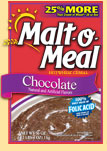 My victory was short-lived. Archer still held the trump card — the one sure way to make me remove the clothes I had just forcibly caused him to wear. With an assist from his convulsive crying and a belly full of Malt-O-Meal, he barfed all over them.
My victory was short-lived. Archer still held the trump card — the one sure way to make me remove the clothes I had just forcibly caused him to wear. With an assist from his convulsive crying and a belly full of Malt-O-Meal, he barfed all over them.
A cautionary tale for all who believe their authority is absolute.
That could have been me
Like most of the rest of the blogosphere, I was strangely affected by the plight of James Kim and his family, snowbound in a remote mountain pass for eleven days after a fateful wrong turn during a routine family drive. After several days and an intensive search, his wife and young daughters were rescued from their stranded car, ironically just hours after James struck out on foot in search of help. He never made it.
People die every day. Plenty of stories are sadder than this one. What makes some grab at the imagination more than others? In this case, for me, the answer was pretty clear (even before I knew about my indirect personal connection to the Kims — they’re close friends of my boss, Matt): James Kim could have been me. He was a middle-class Bay Area computer nerd, intelligent and nice, with a young family that liked to take long car trips.
My own experience with being underdressed, underequipped, and disoriented in a snowy wilderness was orders of magnitude more brief and less perilous, but I think it taught me well enough not to strike out across open country under such circumstances. But how long could I resist the temptation to go for help when my family is freezing and starving before my very eyes? Superior, self-appointed survival experts all over the Internet are today pompously pronouncing that James should never have left the car. Easy for them to say. I think he showed more restraint than I would have under similar circumstances by staying with the car for as many days as he did. And after all, there are worse ways to die than by hypothermia 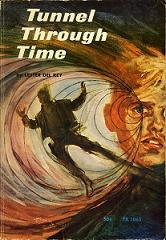 (the end stages of which can be quite misleadingly pleasant — you get warm and drowsy — learned that in fifth grade from Tunnel Through Time by Lester Del Rey) while heroically trying to rescue your wife and children, as half the online world prays for you.
(the end stages of which can be quite misleadingly pleasant — you get warm and drowsy — learned that in fifth grade from Tunnel Through Time by Lester Del Rey) while heroically trying to rescue your wife and children, as half the online world prays for you.
Reportedly, the Kims took an ill-chosen alternate route to get from Interstate 5 inland to US-101 on the coast. How many times have Andrea and I spotted a more-interesting looking road on the map and said, “Let’s have an adventure!” (We did it on this road once near Half Moon Bay and almost had a wilderness crisis of our own — on dry roads, near the heart of the Bay Area — when we nearly ran out of gas as night fell.)
Having grown up on the East Coast, I know how treacherous even slightly hilly, slightly curvy secondary roads can be in the snow, so I think I’d know better than the Kims did about choosing that winding mountain pass. But with just a few modifications, the Kims’ plight could easily have been the Glicksteins’.
[This secton incorporates text originally written in May 2004 for a similar topic on my high school alumni mailing list.]
I think I understand the need of some to make those pompous pronouncements. I know what drives the desire to blame the victim.
Several years ago I got involved in flying. A big part of what a pilot does when not flying is to talk about flying. And read and write about flying. Specifically, there are a few flying magazines that many pilots read. You’ve seen them on the newsstands: “Flying,” “Plane and Pilot,” “AOPA Pilot,” “Private Pilot,” etc.
These magazines are highly formulaic and the writing is uniformly awful. Every month it’s the same test drive of a cool new plane, the same product reviews, the same reports of what our pilot buddies in Congress are doing for us, and the same fights between local airports and the noise-averse communities surrounding them. There’s no doubt in my mind that every pilot skims right over all that junk to head straight for the monthly column about some horrible aviation mishap (columns with names like “Never Again” and “I Learned About Flying From That” and “Aftermath”).
It’s a truism that there’s a little nugget of fear somewhere deep inside every pilot. The accident statistics are very favorable, but of course it’s the grisly stories that stand out in one’s mind. So pilots morbidly devour every accident story, mainly looking for reassurance that they’re immune to whatever mistake that poor bastard made. Didn’t get an updated weather briefing before takeoff? Idiot. Didn’t do his weight-and-balance calculations? Moron. Didn’t budget enough fuel for getting to his alternate landing site? Allowed an impatient controller to bully him into a bad decision? Didn’t heed the rough sound coming from the engine? I’d never do that.
I feel sorry for the victims I read about in those stories, but I freely admit to playing that blame-the-victim game as I read. Usually the mistakes are simple and understandable. Sometimes I can’t find any difference between that poor bastard and the cautious way that I fly, other than dumb luck, and that’s pretty unsettling. But sometimes the lapses in judgment are so egregious that it turns any sympathy I may have felt into impatience, even anger, especially when there are innocent victims involved.
Maybe this is something like how the Monday-morning wilderness quarterbacks are reacting to the Kims’ story. To me, the Kims’ mistakes fall into the simple-and-understandable category. (All too understandable.) For others maybe they are egregious. Seems harsh to me, but at least I can understand it as a difference of degree rather than a difference of kind.
In recent years, when contemplating my own mortality, I’ve found that it’s not me I worry about (as it was when I was younger), it’s the people I’d leave behind. This was true even before I became a parent but is a hundred times truer now. As long as I don’t die stupidly, it’ll be without any serious regrets. (Well, I would like to know how the Harry Potter series turns out.) But I have a strong stereotype in my mind about what losing a father at a young age can do to a couple of boys like Jonah and Archer. In that stereotype they become sullen, mad at the world, unambitious, even self-destructive. This more than anything else is why I hope not to die. There’s an alternate stereotype, where the survivors pull together to endure the crisis and emerge more tightly knit for their loss. This more than anything else is what I hope for the Kims.